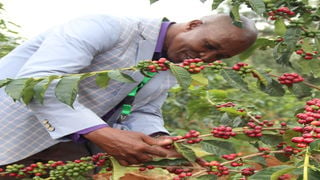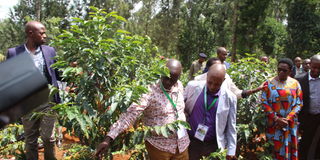
Coffee farmer Charles Mutwiri inspects his bushes at his farm in Imenti North when Deputy President Rigathi Gachagua visited his farm on June 9, 2023.
| Gitonga Marete I Nation Media GroupMeru
Premium
Meru farmer: As everyone else gave up, I smelled the coffee
Driving through Kaing'inyo village, about five kilometres from Meru town in Imenti North, you see neglected coffee trees. The leaves have turned yellow and there are no cherries on the branches.
The coffee bushes are nowhere near what one farmer described during the just-concluded coffee reform conference.
But when you reach his 30-hectare farm, you understand what he meant when he talked about a tree producing more than 30 kilos, as opposed to the national average of two kilos.
The manicured bushes are in stark contrast to those on neighbouring farms, each branch sagging under the weight of the cherries.
Welcome to Charles Mutwiri's coffee farm, which is visited by farmers who want to learn about proper crop management.
Mutwiri wowed delegates, including Deputy President Rigathi Gachagua, when he said one bush could produce up to 100 kilos, prompting the DP to visit his farm.
Over the past three decades, Kenya's annual coffee production has plummeted from 130,000 tonnes to a paltry 34,000 tonnes in the 2021/22 crop year.
Frustrated by the low returns from the cash crop, farmers have abandoned their farms, while others have uprooted the trees and moved on to more profitable ventures.
But there are a few resilient farmers like Mutwiri who have stuck with the crop and invested millions in it. They have reaped rich rewards and have a story to tell.
His more than 40 years of experience in coffee farming has given him such confidence in the crop that when Mr Gachagua visited his farm, he offered to plant coffee on the DP's farm and look after it.
"If you give me a chance, I will show the country that there is money in coffee. I will take care of the bushes and if one does not produce more than 30 kilos, since you have the government machinery, come and arrest me," he said.
Responding to the farmer, the DP said his statement was proof that coffee production had been curtailed by poor pay.
"I have a five-acre piece of land somewhere and I will set an example. This farmer will plant coffee on that farm and show that we can succeed in this journey. Farmers want money. Show them the money and they will grow coffee," said the DP.

Coffee farmer Charles Mutwiri (centre) shows Deputy President Rigathi Gachagua his bushes during a visit to his farm on June 9, 2023.
Mutwiri's journey has been long and arduous, given the challenges facing the coffee sector.
He inherited 150 coffee bushes from his father in the early 1980s and has since become one of the most successful farmers in the region. He has since expanded his coffee farm from less than one hectare to more than 30 hectares at his home and leased land in the neighbourhood.
Today, his farm is a hive of activity, employing at least 100 casual workers on busy days, while he has 12 permanent employees working in his factory.
"I started grinding coffee with a small hand-held machine. But nothing is small because at the end of the day, everything counts. That is how I was able to buy a pulping machine worth over Sh2 million to process the cherries on time," he said, adding that he is also complying with regulations that require estate farmers who process their coffee not to buy cherries from smallholders.
Mutwiri explained how he has maintained and developed an improved high yielding variety, SL28 Arabica Coffee, in his nurseries for transplanting and nurturing.
He is currently replacing the Ruiru 11 variety he has grown over the years with the SL28 and while he harvests about 200,000 kilos a year, he is aiming for a million kilos a year with the new variety.
If well looked after, he says, each tree can produce more than 100 kilos, with a farmer earning Sh2.5 million a year from an acre of 500 trees at a rate of Sh100 a kilo. The annual cost per acre cannot exceed Sh500,000, he notes.
"There is money in coffee and all farmers need is a little support and we will be back to the 1980s and beyond. I am convinced that if we put everything in place with the coffee reforms, it is easy to produce even one million tonnes a year. We will literally be harvesting money from the trees," he said.
Mutwiri, affectionately known as 'Mkarimu' (generous) by his fellow villagers, also trains other farmers in good production practices and runs a nursery from which he sells coffee seedlings.
Although it costs about Sh100 to germinate and grow each seedling, he sells them for Sh50 so that he can help other farmers. He sells about 100,000 seedlings a year, depending on orders, he said.
"Through experience and research, I have gained skills in plant breeding and have managed to produce between 30 and 35 kilos from each bush for two seasons. Farmers want to grow coffee but they have been neglected and with more investment in the farms, we can produce huge quantities," he said.
Mutwiri's efforts in coffee farming have led to his appointment as a director of the New Kenya Planters Cooperative Union.





